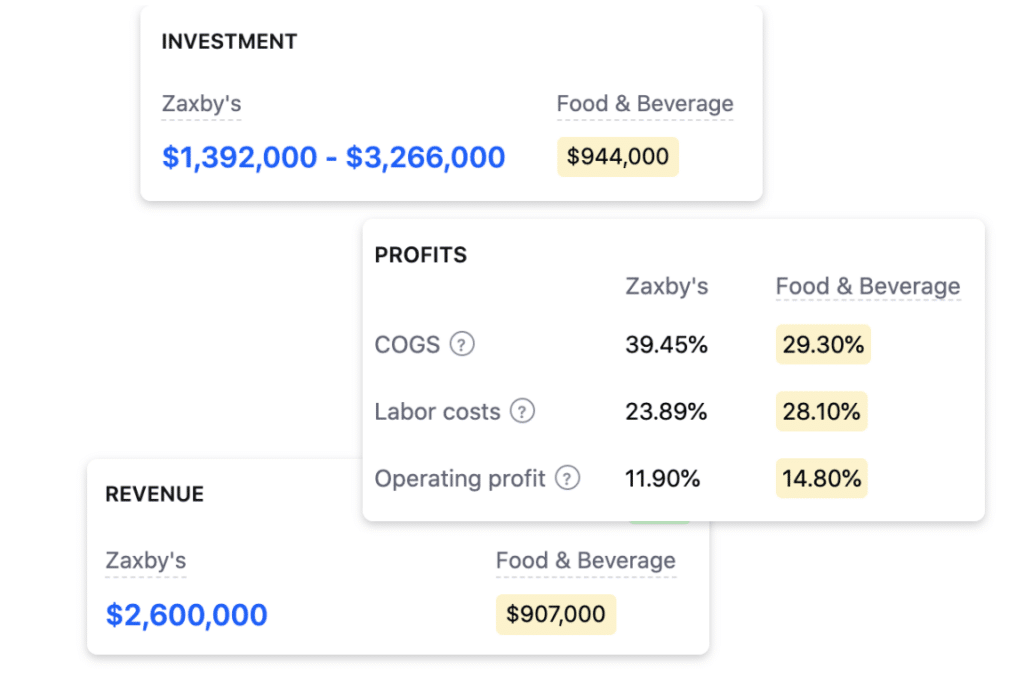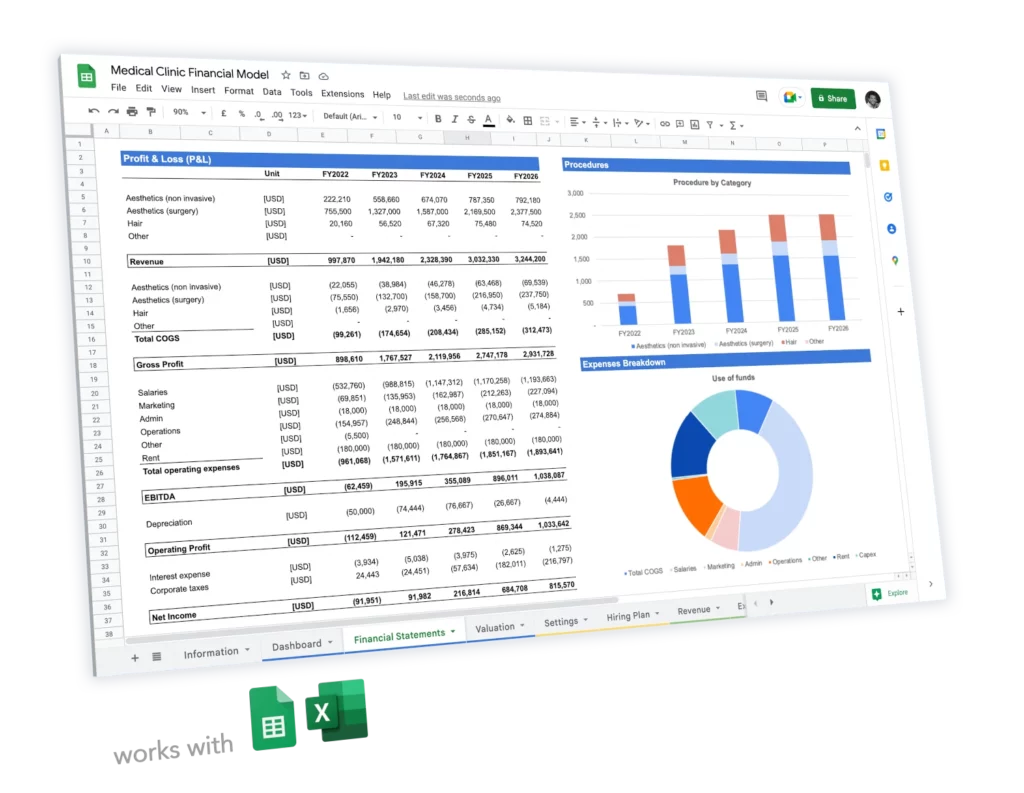
QDOBA Mexican Eats Franchise Costs $253K – $1.3M (+ 2024 Profits)
Here’s what you need to know if you’re interested in opening a Qdoba Mexican Eats franchise.

|
KEY FRANCHISEE INFORMATION
Here are the most important stats to know for franchisees.

NUMBER OF LOCATIONS

INITIAL INVESTMENT
$253,000 – $1,307,000

ROYALTY FEE

REVENUE PER YEAR
$1,333,000
Qdoba Mexican Eats, originally founded as Zuma Fresh Mexican Grill in Denver, Colorado in 1995, has evolved significantly over the years. The brand underwent a name change to Z-TECA in 1997, and then to QDOBA Mexican Grill in 1999, before finally settling on QDOBA Mexican Eats in 2015. This progression reflects the brand’s commitment to innovation and adapting to consumer preferences.
QDOBA prides itself on serving fresh, flavorful Mexican cuisine without the use of microwaves, freezers, or can openers, setting it apart from competitors by emphasizing quality and freshness in its food preparation (QDOBA Eats Franchise).
Headquartered in San Diego, California, QDOBA has expanded its reach considerably since its inception. The franchise started franchising in 1997, two years after its foundation and has since grown across the United States, Canada, and even Puerto Rico.

Number of locations
Here’s how many Qdoba Mexican Eats there are in the US today.
| TOTAL UNITS 631 |
| FRANCHISED UNITS 342 |
Find the most profitable franchises on

Compare 1,000+ franchises and download unlimited FDDs
 | Qdoba Mexican Eats |
| FRANCHISE FEE | $30,000 |
| ROYALTY FEE | 5.00% |
| INITIAL INVESTMENT | $253,000 – $1,307,000 |
| AVERAGE REVENUE | $1,333,000 |


Initial investment
Here’s what you can expect to spend to start a Qdoba Mexican Eats franchise.
| Type of Expenditure | Amount |
|---|---|
| Franchise Fee | $30,000 |
| Development costs: plans, legal fees, permits | $10,000 – $50,000 |
| Leasehold improvements | $180,000 – $500,000 |
| Furnishings, fixtures and equipment | $185,000 – $380,000 |
| Signage | $5,000 – $50,000 |
| IT and other Systems | $33,700 – $84,000 |
| Opening inventory | $5,000 – $10,000 |
| Miscellaneous pre-opening expenses | $5,000 – $15,000 |
| Grand opening advertising | $5,000 – $25,000 |
| Insurance | $5,000 – $10,000 |
| Business licenses, health permits and similar permits | $500 – $3,000 |
| Total Estimated Cost (excluding real property and liquor license costs) | $489,000 – $1,307,000 |
Note: The table above provides a snapshot of the main costs associated with starting the most common franchise format (as disclosed in the Item 7 of the Franchise Disclosure Document). For a complete overview of all the expenses involved with the various formats offered by the franchisor, please consult the Franchise Disclosure Document.

Franchise fees & Royalties
Here are the main ongoing fees the franchisor will ask you to pay going forward to run the franchise.
Initial Franchise Fee
- The Franchise Fee for traditional units is $30,000.
- For Non-Traditional units, the Franchise Fee is $15,000.
Development Fee
- When signing a Development Agreement, a nonrefundable development fee of $10,000 for each site to be developed is required.
Royalty Fee
- Traditional sites: 5% of gross sales.
- Non-traditional sites: 6% of gross sales.
Marketing Fee
- For franchisees: 2.25% of gross sales.
- For licensees: 1.75% of gross sales.
Local Advertising
- Required spending on local marketing programs: 1.25% of gross sales.
Technology and Support Fees
- Technology Support License and Installation: $549 (one-time upon opening).
- IT Base Services: $6,700 to $35,000 per year.
- IT Support Services: $4,400 per restaurant per year.
- Database Configuration: $750 (one-time upon opening).
- IT Project Services: $300 to $500 per project, plus project costs.
Other Fees
- Transfer Fee: Up to $5,000.
- Renewal Fee: Greater of fifteen percent (15%) of the then-current franchise fee or $5,000.
- Relocation Fee: $5,000.

Revenue & Profits
Here’s how much revenue and profits you can make with a Qdoba Mexican Eats franchise.
Find the most profitable franchises on

Compare 1,000+ franchises and download unlimited FDDs
 | Qdoba Mexican Eats |
| FRANCHISE FEE | $30,000 |
| ROYALTY FEE | 5.00% |
| INITIAL INVESTMENT | $253,000 – $1,307,000 |
| AVERAGE REVENUE | $1,333,000 |

Franchise Pros and cons
Pros
- A standout menu: the popular three-cheese queso dip plus 30 toppings have made Qdoba a leading fast-casual Mexican restaurant. In addition, the flavorful queso diablo, the popular Cholula chicken, and the highly sought-after cauliflower are a testament to its continued innovativeness. This helps the franchisor stand out in an otherwise competitive American food and beverage industry.
- Flexible footprints: the brand’s relatively small footprints make it possible to launch a new franchise in any space. This promotes flexibility and efficient inventory management.
- Brand recognition: Qdoba Mexican Eats’ strong brand benefits its franchisees. The restaurant chain appeals to multiple demographics and presents a massive opportunity for franchisees to grow with a reputable brand.
- Third-party financial sources: Qdoba’s affiliates may help new restaurant owners secure funding to cover the startup costs, inventory, and equipment.
- Corporate and in-store training: Qdoba Mexican Eats helps franchisees keep up to speed with the best restaurant management practices. All franchisees must complete 360 hours of intense on-the-job training plus 9 hours of classroom training as part of the Franchise Agreement.
- Customizable marketing and promotional tools: the franchisor is committed to providing useful marketing tools to help franchisees get off the ground. The trade area marketing software helps new store owners select the best location for their businesses.
- Ongoing support: the restaurant chain provides world-class support to help franchisees succeed in the competitive field. The exclusive support continues from the grand opening until you run a successful business. It covers field operations, meetings and conventions, online support, site selection, and security and safety procedures.
Cons
- Stiff competition: despite its unique and alluring menu, Qdoba Mexican Eats faces stiff competition from popular restaurant chains like Chipotle Mexican Grill and Baja Fresh.
- No absentee ownership: new restaurant owners must commit to the day-to-day running of the store operations.
- No part-time management: franchisees must demonstrate a full-time, long-term commitment to running the franchise.
- 15 employees to run the business: Qdoba Mexican Eats has a minimum employee requirement for launching the franchise.
- No exclusive territories: the Franchise Agreement does not provide exclusive rights to run a single restaurant at a designated location.
How to open a QDOBA Mexican Eats Franchise
Opening a Qdoba Mexican Eats franchise involves several steps, designed to ensure you are a good fit for the franchise. Here are the main steps to follow to open a Qdoba Mexican Eats franchise.
1. Research and Initial Inquiry
- Begin by thoroughly researching the Qdoba franchise opportunity to understand its business model, brand values, and market positioning.
- Visit the official Qdoba franchise website to gather information about the franchise, its history, and what it offers to franchisees.
- Submit an initial inquiry or interest form on the Qdoba franchise website, providing your contact details and any initial questions you may have.
2. Review Franchise Disclosure Document (FDD)
- Once your initial inquiry is reviewed, you may be provided with a Franchise Disclosure Document (FDD) that outlines detailed information about the franchise opportunity.
- Carefully review the FDD to understand the financial commitments, legal obligations, and operational requirements of owning a Qdoba franchise.
3. Financial Assessment and Qualification
- Assess your financial resources to ensure you meet the financial requirements specified by Qdoba, such as minimum net worth and liquid capital.
- Qdoba or its representatives may conduct a financial assessment to verify your financial capability to open and operate a franchise.
4. Initial Consultation and Interviews
- Participate in initial consultations and interviews with the Qdoba franchise team to discuss your interest, experience, and qualifications.
- Use this opportunity to ask detailed questions about the franchise, support structures, and expectations from franchisees.
5. Territory Selection and Site Approval
- Work with the Qdoba franchise team to identify and select a suitable territory for your franchise location.
- Once a territory is selected, undergo the site selection process, which may include identifying potential locations, site visits, and obtaining Qdoba’s approval for the chosen location.
6. Franchise Agreement and Fees
- Upon approval of your franchise application and site, you will be presented with a Franchise Agreement to sign.
- Review the Franchise Agreement with legal and financial advisors to fully understand your obligations and rights as a franchisee.
- Pay the initial franchise fee and any other required fees to formalize your franchise ownership.
7. Training and Support
- Attend and complete the comprehensive training program provided by Qdoba, which covers operational procedures, brand standards, and business management.
- Take advantage of ongoing support from the Qdoba franchise team, including marketing, operations, and menu development.
Disclaimer
Disclaimer: This content has been made for informational and educational purposes only. We do not make any representation or warranties with respect to the accuracy, applicability, fitness, or completeness of the information presented in the article. You should not construe any such information or other material as legal, tax, investment, financial, or other professional advice. Nothing contained in this article constitutes a solicitation, recommendation, endorsement, advertisement, or offer to buy or sell any franchises, securities, or other financial instruments in this or in any other jurisdiction in which such solicitation or offer would be unlawful under the franchise and/or securities laws of such jurisdiction.
All content in this article is information of a general nature and does not address the detailed circumstances of any particular individual or entity. Nothing in the article constitutes professional and/or financial and/or legal advice, nor does any information in the article constitute a comprehensive or complete statement of the matters discussed or the law relating thereto. You alone assume the sole responsibility of evaluating the merits and risks associated with the use of any information or other content in this article before making any decisions based on such information or other content.
Interested in buying a Qdoba Mexican Eats franchise?
Download the financial plan built with the latest Franchise Document.



